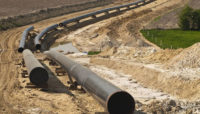A three-year dispute over the $1-billion Transco natural gas pipeline could be over.
Project developer Williams Cos. said on May 18 it would not refile applications “at this time” for the proposed 23-mile underwater line across Raritan Bay and New York Harbor after New York and New Jersey agencies denied clean water permits for the third time.
The 26-in.-dia line was to transport natural gas supply to customers in New York City and Long Island.
“The decision to pause this important infrastructure project is unfortunate for the region as the design and construction would have generated valuable economic activity,” Laura Creekmur, a Williams vice president, said in a statement.
“This is a big win for climate change and a big blow for the battle against fracking,” said Jeff Tittle, director of the New Jersey Sierra Club, among the groups that have fought the project since the first application was filed in 2017.
The New York State Dept. of Environmental Conservation denied the permit based on Transco’s inability to demonstrate the project’s compliance with all water quality standards, the agency’s letter to the company said.
The project would disturb sediments that are contaminated with copper and mercury. The company also proposed to bury the pipeline 4 ft under the seafloor rather than the 6-ft depth required for other offshore projects, including transmission lines for offshore wind.
New York requires a statewide reduction in greenhouse gas emissions of 40% by 2030 and the pipeline project could extend the amount of time that natural gas may be relied on to produce energy, which would slow the state’s transition away from fossil fuels to renewable energy, the denial letter said.
It also noted that the production of the gas used by the pipeline would produce greenhouse gases associated with hydraulic fracking, and state law governing emissions includes greenhouse gases produced outside the state that are imported into the state.
“The continued long-term use of fossil fuels is inconsistent with the state’s laws and objectives to prevent the most severe impacts from climate change,” the denial letter said.
New Jersey said that the company must show a compelling need for the project, and consideed New York’s denial.
Williams did not rule out the possibility it would refile applications in the two states, however.
“While we continue to believe in the fundamentals of the project, we will not refile in New Jersey or New York at this time,” Creekmur’s statement said.






Post a comment to this article
Report Abusive Comment